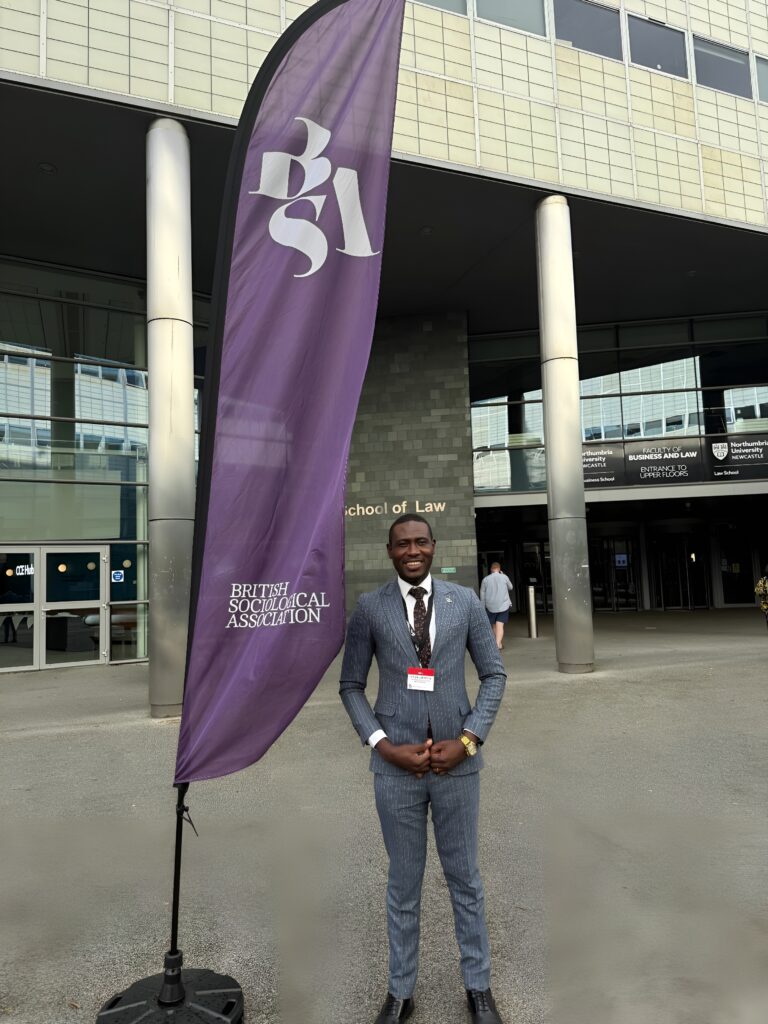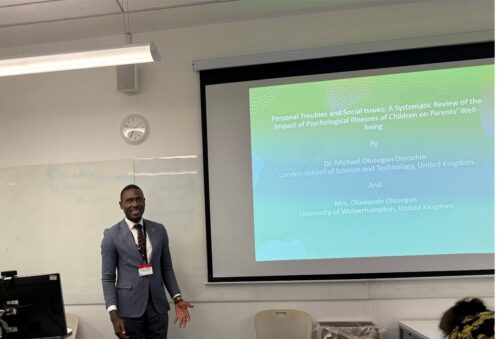LSST Birmingham Lecturer Looks Behind the Diagnosis: How a Child’s Psychological Illness Reconfigures an Entire Household
By Kunal Chan Mehta | Article Date: 2 October 2025

By Kunal Chan Mehta | Article Date: 02/10/2025
When Dr Michael Olusegun Demehin, DMU Course Coordinator, Module Lead and Senior Lecturer in Health and Social Sciences, at LSST Birmingham, stepped onto the podium at Northumbria University, he did more than present another paper at the British Sociological Association’s Medical Sociology Conference – he reframed a quiet crisis. His systematic review, Personal Troubles and Social Issues: A Systematic Review of the Impact of Psychological Illnesses of Children on Parents’ Well-being, unravels how what is commonly perceived as a private, child-centred pathology spills – inevitably and persistently – into both the fabric of family life and public services.
The thesis is straightforward but seismic: childhood psychological disorders should not be siloed as solely “child problems.” Using PRISMA-guided methods, Dr Demehin and his team synthesised peer-reviewed work from 2010 to 2024 across medical sociology, clinical psychology and family studies to demonstrate that the psychic toll on parents is both individual and structural. In short, the private trouble is a public issue – a point LSST health researchers recognise as sociological common sense. The conference, which attracts several hundred delegates each year, proved a fitting forum for such a claim.
What the research found
What the research found was clear. Caregiving emerged not as a finite task but as a form of chronic labour – an exhausting blend of emotional intensity, time-consuming duties, extended administration and unrelenting vigilance that left many parents drained and burned out – edging into clinical anxiety.
The burden is compounded by stigma and social isolation: families reported being judged, excluded, or misread, their struggles magnified by the silence of others, which in turn deterred them from seeking help. Within households, the pressures warped the fabric of intimacy itself, with marriages strained and kinship ties fraying under the heavy weight of responsibility.
“Too often we treat the child as the sole locus of pathology,” said research lead Dr Demehin. “Our review shows that parents are co-sufferers and co-carers – their mental health trajectories are entwined with their child’s. To ignore that is to ignore half the problem.”
Beyond the private sphere, the costs spilt into the economic realm: many parents reduced work hours, declined promotions or overtime, or left employment altogether, sacrifices with rippling consequences for workforce participation and social policy. And throughout it all ran the corrosive frustration of healthcare navigation, as families confronted fragmented services, long waits alongside opaque systems that deepened uncertainty and eroded trust in the very institutions meant to offer relief – a space where policy and practice have, hitherto, been remiss.
The argument for a paradigm shift
Dr Demehin calls for a reorientation of clinical and policy responses. He wants a move from discrete, child-only interventions to integrated, family-centred care that recognises the dyadic and networked nature of mental health.
He and his research team advocate for interdisciplinary, sociologically informed policy – inclusive reforms that treat family well-being as a health metric in its own right. This is not a rhetorical flourish; it is evidence-based on the synthesis of studies spanning a decade and a half.
“This review is a clarion call to institutions,” said Mr Ali Jafar Zaidi, CEO at LSST. “If policy is the scaffolding of social change, then we must redesign the scaffolding so that it supports whole families, not only children – sine qua non for equitable and effective mental healthcare.”

Why this matters
The research implications straddle three arenas:
- Practitioners should screen for caregiver distress and embed family functioning into treatment plans.
- Labour protections, flexible schedules and caregiver leave emerge as pragmatic levers to mitigate economic fallout.
- Investment in integrated services, anti-stigma campaigns and caregiver respite must be recast as priorities, not afterthoughts.
Dr Demehin explicitly links these recommendations to social determinants of health, such as poverty, housing instability and unequal access to services compound the caregiver burden. Their synthesis thus foregrounds equity – the idea that social stratification modulates both exposure to and consequences of child psychological illness.
What Dr Demehin propose is not merely an expansion of clinical remit; it is an epistemic shift. The personal troubles of caregiving are symptomatic of social arrangements such as policy gaps and professional silos. If we are serious about mental health – inter alia, equity, dignity and resilience – then family-centred care must move from laudable ideal to legislative reality.
LSST will soon announce the publication date of Dr Demehin’s latest research. In addition, Dr Demehin will be leading a series of workshops on Psychological Illness across LSST campuses in November-December 2025.
For additional information or interviews please direct questions to LSST’s Public Relations Manager via kunal.mehta@lsst.ac.
We hope you enjoyed reading LSST News. Join our vibrant academic community and explore endless opportunities for growth and learning at www.lsst.ac/courses or via admissions@lsst.ac. Discover your path at LSST and embark on a transformative educational journey today. Think Higher. Think LSST.




